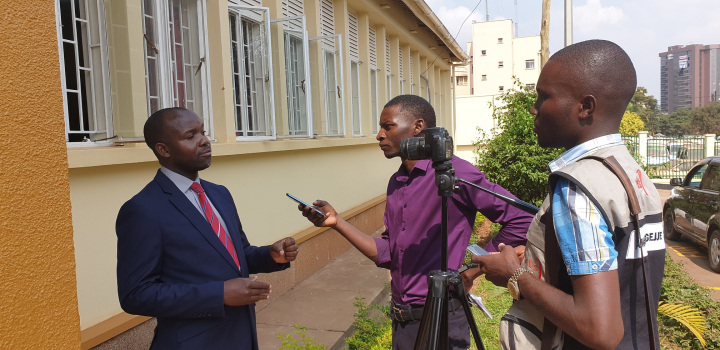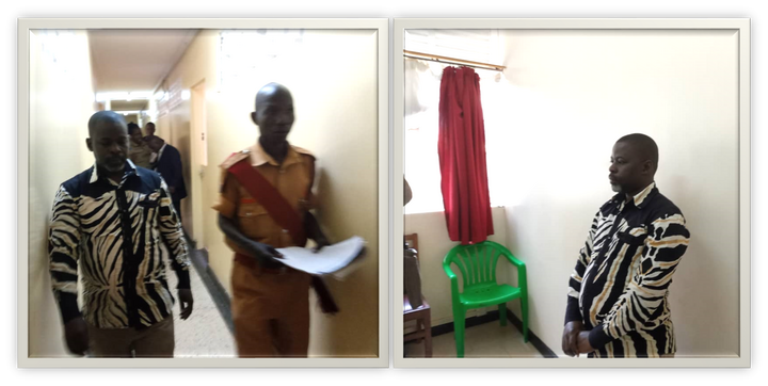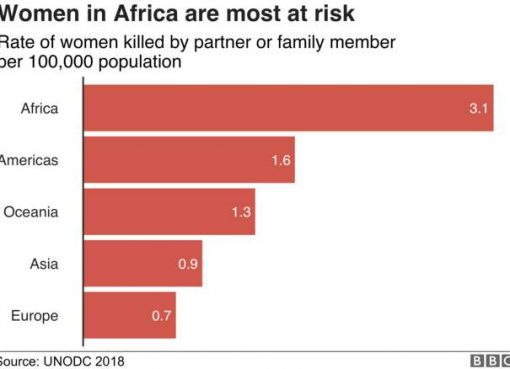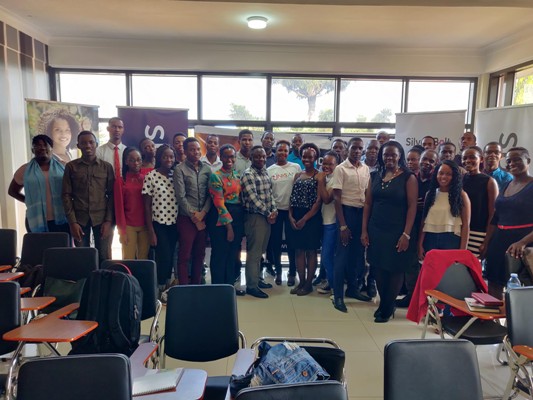A Kampala-based pastor has been remanded to Luzira Prison till Friday, 02 August 2019, by Buganda Road Chief Magistrate’s Court for allegedly operating an illegal radio station.
Apostle Bosio Eddie (Right in featured photo) of Ntinda, 42, is charged with two counts of installing and operating radio broadcasting apparatus without license, and broadcasting without license, contrary to the Uganda Communications Act 2013.
Alongside others still at large, Apostle Eddie allegedly committed the offence at Kigowa, Ntinda, in Kampala District, between December 2018 and July 2019 when he operated radio broadcasting apparatus for IAM FM without a license.
He was arrested by UCC officers for airing church services on his illegally installed 104.3 IAM FM station.
Appearing in court on Tuesday, 30 July 2019, Eddie denied the charges.
Abudu-Sallam Waiswa, the Head Legal at UCC, explained that broadcasters are required to have a license to ensure order, professionalism and effective utilisation of the broadcasting equipment and frequencies.
“We believe that the evidence we so far have is sufficient to have this man convicted,” Waiswa told journalists outside the court. “He has denied the charges but we have evidence, he was found broadcasting.”
Installation and operation of radio broadcasting apparatus without license, Waiswa explained, carries a maximum sentence of five years in prison or a fine of up to 1500 currency points, which is equivalent to UShs 3,000,000.

Ibrahim Bbossa, the Head Public and International Relations at UCC, pointed out that many Ugandans “don’t understand the gravity of the offence [illegal broadcasting].”
He told journalists that illegal broadcasting can cause interference and danger to other services, including security agencies and air operators that use the same.
“Some of the frequencies that errant people are trying to violate have been issued to other sensitive operations like security, aviation and it is possible for somebody to cause a catastrophe by self-allocating and self-assigning a frequency that has not been issued by the Commission,” Bbosa cautioned.
UCC engages in regular monitoring and supervision of frequencies across the country and it was during such routine work that an unknown frequency was traced in Ntinda.
“Because this signal was not known to the commission, our enforcement and investigation team followed up and they found that there was actually equipment that was installed and [it was] broadcasting as a radio station,” he said.
Bbossa added that UCC is mandated to ensure the spectrum is well utilized, and illegal operations and interference are minimised.
To crack the whip on illegal and non-compliant broadcasters, the Commission last year installed high-tech equipment in Masindi and Mbale. Besides generating signals on unregistered broadcasters, the same technology helps to collect information on broadcasters whose rights have been suspended.
UCC puts compliance with broadcasting requirements at 60%.
“It is mainly issues like stations going out of their bandwidth and interfering with another’s frequency,” says. Irene Kaggwa, the UCC Director Engineering and Communications Infrastructure.
According to section 26(1) and (3) of the Uganda Communications Act 2013, no person is allowed to install radio, TV or broadcasting apparatus without a license from UCC.
The law defines broadcasting as the transmission of sound, video or data intended for simultaneous transmission to the public.
Waiswa revealed that UCC is about to embark on a nationwide campaign to crack down on community audio towers locally known as bizindalo, especially those who have defied the UCC directive to dismantle them.





